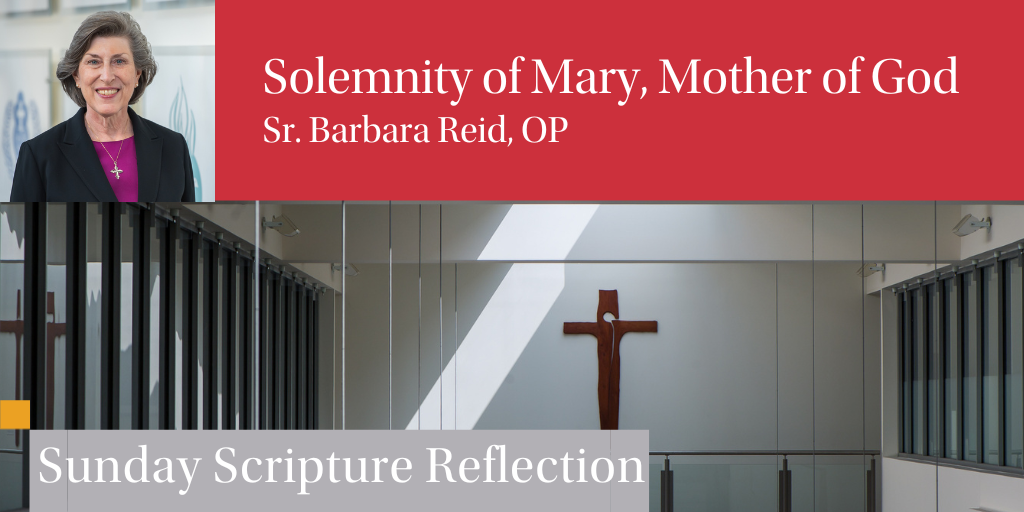
Readings:
Reading I: Num 6:22-27
Psalm 67:2-3, 5, 6, 8
Reading II: Gal 4:4-7
Gospel: Luke 2:16-21
“The Lord look upon you kindly and give you peace!” (Num 6:26)
The founder of Mothers Against War wears a button that reads, “War Undoes Mothers’ Work.” Our liturgical celebration today likewise juxtaposes Mary, the Mother of God, and prayer for world peace. Today’s readings speak to us of God’s motherly love and offer Jesus’ mother as an example for how that maternal care becomes enfleshed in humankind. The feast today is not a sentimental exaltation of motherhood, but offers guidance for how men and women alike can engage in maternal work that averts war and builds peace in the human family.
The gospel is the same as that of Christmas Day, but on this feast day, while we are still celebrating the birth of Christ, our attention is drawn to Mary. She receives the divine message from visiting shepherds, proclaiming glory to God and peace for all peoples on earth. Mary keeps in her heart all that she has heard, reflecting on it again and again. As at the annunciation (Luke 1:26-38), she does not fully understand what God is doing or asking of her, but the Spirit gives her the ability to say yes, trusting in the One who has always been faithful. She maintains this stance throughout her life, as also when she treasures everything in her heart after the disturbing episode of having found her twelve-year-old son among the teachers in the temple (Luke 2:51). A fundamental attitude for bringing to birth God’s dream of peace for us is to live like Mary, in contemplative wonder, dwelling in mystery, trusting in the ways of the Holy One.
Another key ingredient in building peace is highlighted in the first reading and in the psalm response. They invite us to live in a stance of blessedness, accepting that we are blessed and beloved of God, which then enables us to extend blessing to all peoples. Mary exemplifies this stance, when at the visitation, she receives blessing through Elizabeth, who exclaims that Mary and the child she carries are blessed. Elizabeth also blesses Mary for believing that there would be fulfillment of what was spoken to her by the divine messenger (Luke 1:39-45). As the gospel continues, Mary’s son, taught well by his mother, helps his disciples know how to live in blessedness. “Love your enemies, do good to those who hate you, bless those who curse you, pray for those who abuse you,” he says (Luke 6:27-28). Disciples who live this way reflect divine parental love. As “children of the Most High,” they emulate the One who is “kind to the ungrateful and the wicked” (Luke 6:35).
In the second reading, Paul, speaking to a community of Gentile Christians, uses the metaphor of adopted children to assure them of their equal stance as begotten of God and heirs to all the divine promises. In the context of today’s feast, we might read this as an invitation to regard all people as children of God, our brothers and sisters, all embraced by God’s boundless love. The Spirit not only helps us cry out to God as our own parent but also helps us to hear this same cry on the lips of our siblings throughout the globe. The Spirit helps us to seek only good for all our siblings and to find ways other than war to resolve our differences.
In 1968, when Pope Paul VI first asked that January 1 be observed each year as a World Day of Peace, he noted that “the world must be educated to love Peace, to build it up and defend it.” Peace building does not come as instinctively as maternal love, but both can be learned and taught. We can turn to Mary to show us the way to contemplate God’s motherly love, to live in blessedness, and to teach others the ways of building peace.
These reflections are taken from Barbara E. Reid, Abiding Word. Sunday Reflections for Year A (Liturgical Press, 2013), 13-14.
